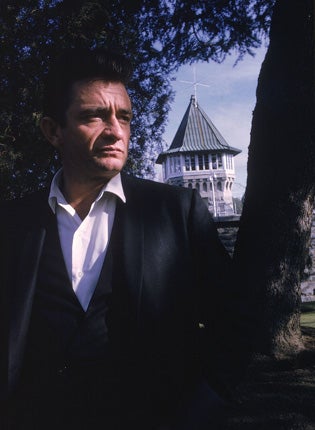Your support helps us to tell the story
From reproductive rights to climate change to Big Tech, The Independent is on the ground when the story is developing. Whether it's investigating the financials of Elon Musk's pro-Trump PAC or producing our latest documentary, 'The A Word', which shines a light on the American women fighting for reproductive rights, we know how important it is to parse out the facts from the messaging.
At such a critical moment in US history, we need reporters on the ground. Your donation allows us to keep sending journalists to speak to both sides of the story.
The Independent is trusted by Americans across the entire political spectrum. And unlike many other quality news outlets, we choose not to lock Americans out of our reporting and analysis with paywalls. We believe quality journalism should be available to everyone, paid for by those who can afford it.
Your support makes all the difference.Investigators at Folsom State Prison in California are trying to piece together the series of events that led guards to use semi-automatic weapons to fire on a crowd of unruly inmates, leaving seven men needing hospital treatment for their injuries.
Two hundred prisoners began what a spokesman called a "major riot" in the main exercise yard of the prison, where Johnny Cash played a famous concert in 1968, around 7.30pm on Friday. Fifty officers spent half an hour unsuccessfully trying to contain the violence, firing tear gas and rubber bullets, before they began using live rounds.
"We tried to control the situation with chemical agents dispersed over the crowd," said Folsom's Lt Anthony Gentile. "We fired several rounds of rubber bullets and that didn't stop them from fighting."
The riot ended shortly after guards opened up with mini-14 rifles. None of the injured prisoners are in a life-threatening condition, and no officers were hurt during the incident.
The prison is likely to remain on "lock-down" for several weeks, with inmates largely confined to their cells and prevented from receiving visitors, while investigators work out what caused the riot.
"At this point we have reviewed some of our surveillance tapes and all we've been able to gather is it just erupted all at once," added Lt Gentile. "It started at the handball court and just gradually migrated to several areas of the main yard."
Friday's events were the latest in a series of incidents which have shed a harsh light on conditions at Folsom, a medium-security facility built in 1880, where between 15 and 20 assaults are being reported each week. In November, eight people were injured when another riot, on that occasion involving 120 inmates, broke out in the dining hall.
The institution, roughly 20 miles from Sacramento, owes its fame to Cash, who wrote his song "Folsom Prison Blues" in 1955. Thirteen years later, he erected a makeshift stage in the cafeteria to perform for inmates, in a concert portrayed in the Oscar-winning film Walk the Line. He also recorded an album there.
At the time, Folsom was considered a model facility, and received visitors from across the world hoping to learn from its rehabilitation programmes.
Today, it suffers from chronic over-crowding – 3,540 inmates are held in cells originally designed for 1,800 – and almost all of its education and training courses have been scrapped due to budget cuts.
The prison today is rife with drug and gang activity, inmates are segregated by race, and it was recently described by Lt Gentile as "a pressure cooker". Where Folsom once boasted the best reoffending rates in America, it now has one of the worst: only one in 10 inmates receives any sort of education or training, and 75 per cent return to jail within a year of their release.
In that respect, its condition mirrors that of California's wider prison system, which has for years been in a state of crisis. A series of tough-on-crime laws endorsed by voters mean that even minor crimes attract punitive sentences. A "three strikes" rule passed in 1994 means that third time convictions for offences like shoplifting can result in life imprisonment.
The state's overall prison population has duly increased from 20,000 in the early 1980s to almost 170,000 today. Overcrowding is now so rife that a federal court this year ordered the release of 38,000 inmates because they are living in conditions that violate their constitutional rights. That ruling was appealed, and the case will soon be heard by the Supreme Court.
Whether law-abiding taxpayers are actually benefiting from the current state of affairs is open to debate. Crime rates have barely changed over the past decade. And while public finances are stretched to breaking point, the state is spending $10bn a year on keeping people locked up – roughly the amount that it spends on its entire education system.

Join our commenting forum
Join thought-provoking conversations, follow other Independent readers and see their replies
Comments